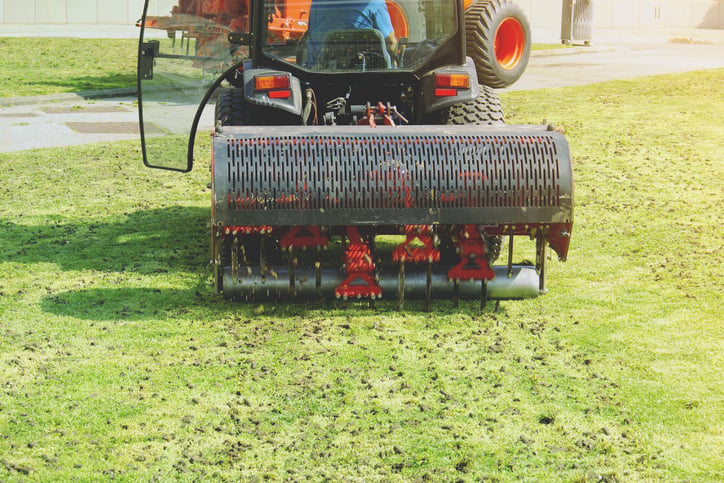There’s a time for everything, right? Like when to aerate lawns in Michigan. It’s a question we get a lot.
Lawn aeration is an important part of any good lawn care plan. It can help break up compacted soil and allow your soil better access to the nutrients it needs.
So, let’s not only find out when to aerate lawns in Michigan but why poking holes in the soil surface can create such a healthy lawn.
What Is Lawn Aeration?
Core aeration breaks up tightly-packed soil by removing plugs of dirt. The holes it leaves behind allow oxygen and water to get to the root zone. It essentially provides pathways for nutrients to enter the soil and reach plant roots. The plugs will sit on top of your lawn, where they decompose and return nutrients to the soil.
Why You Might Need To Aerate Your Lawn
Soil compaction is one of the top reasons you might need to aerate. Compacted soil will keep vital nutrients from feeding the roots of your grass. Check your lawn's soil with a screwdriver to see if it's hard and compacted.
Other signs that you may need to aerate include:
- Pooling water: After a rainstorm, look for pooling water.
- Too much thatch: A layer of lawn thatch that is more than one inch thick is never good. It, like soil compaction, can rob your grass of the nutrients it needs.
- Spongy grass: If your grass feels spongy underfoot, it's a sign that your thatch layer is too thick.
It’s vital that your lawn gets the air, water, and nutrients it needs. Water and fertilizer won’t do your lawn much good if the soil is too compacted or covered in a thick layer of thatch. Your grass roots will suffer.
Benefits of Core Aeration
The most noticeable benefit of core aeration is a beautiful, healthy lawn. You’ll be able to tell right away that your grass and soil are in good condition.
Other benefits include:
- The holes created by the tines will give your grass more access to the air, water, and fertilizer it requires.
- By removing soil cores, there’s less soil compaction. This helps the roots of your grass spread. It will also help reduce thatch build-up.
- Your lawn's roots will not only be able to spread farther, but they’ll grow deeper, which will strengthen it. You’ll have a stronger root system overall.
You’ll also improve your lawn’s drought tolerance. This can help you save on water bills.
When To Aerate Lawns In Michigan
Warm-season grasses should be aerated between late spring and summer when the temperature is warm.
Here in Michigan, we have cool-season grasses, which grow in the spring and fall. This means that aerating your grass in Michigan is best done in the late summer or early fall.
A fall core aeration treatment will assist in strengthening your lawn's roots before the harsh Michigan winter arrives, as well as set your grass up for success next spring. It's never too early to start thinking about your fall lawn care.
Lush Lawn Core Aeration/Overseeding Services
Here at Lush Lawn, we can combine our fall aeration service, with overseeding. Aerating will improve the seed’s interaction with the soil, resulting in a higher germination rate.
Overseeding will thicken your lawn and improve its appearance over time. You’ll also see fewer weeds. If you’re interested in learning more about either service, contact us today.
